Home > Schengen Visa Requirements in 2026

Schengen Visa Requirements in 2026
For millions of travelers who head to Europe, a Schengen visa is an expected, normal part of the journey.
While that is the case, it can seem like a daunting undertaking, especially if it's your first time going through it.
There are a lot of questions first-time visa applicants can have. What are the Schengen visa requirements? Is Schengen travel insurance really mandatory? Which requirements apply to you? Are there any that don't?
We'll cover topics from passports and visa insurance to sufficient funds and accommodations, as well as the basics like what a Schengen visa is in the first place.
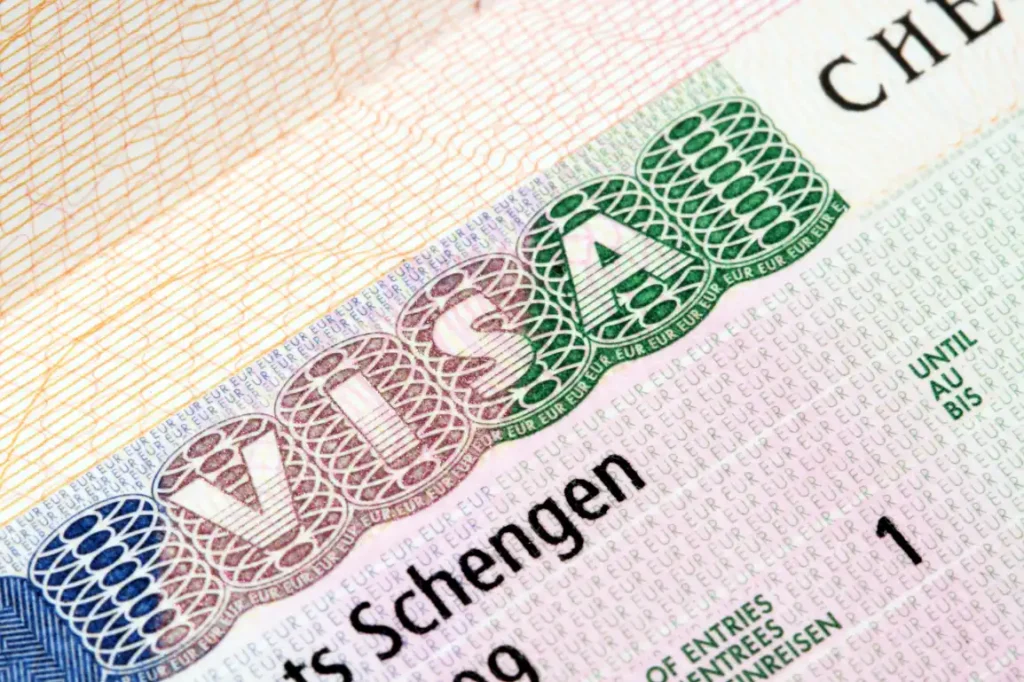
What is a Schengen visa?
A Schengen visa allows its holders to visit one or more countries in the Schengen zone.
How many times you can enter the Schengen area, and for how long, depends on your specific visa.
The Schengen area is a group of countries (there are currently 29) that have agreed to specific terms that have allowed them to abolish internal border checks between them.
What does that mean for travelers specifically? It means that once you’re approved to visit one of the Schengen countries, you’re generally allowed to travel to any of them, so long as your visa is still valid.
Schengen visas are physically "pasted" into your passport.
It's worth noting that in some specific cases, your Schengen visa may not authorize you to travel everywhere in the Schengen area. While this is rare, it's helpful to know.
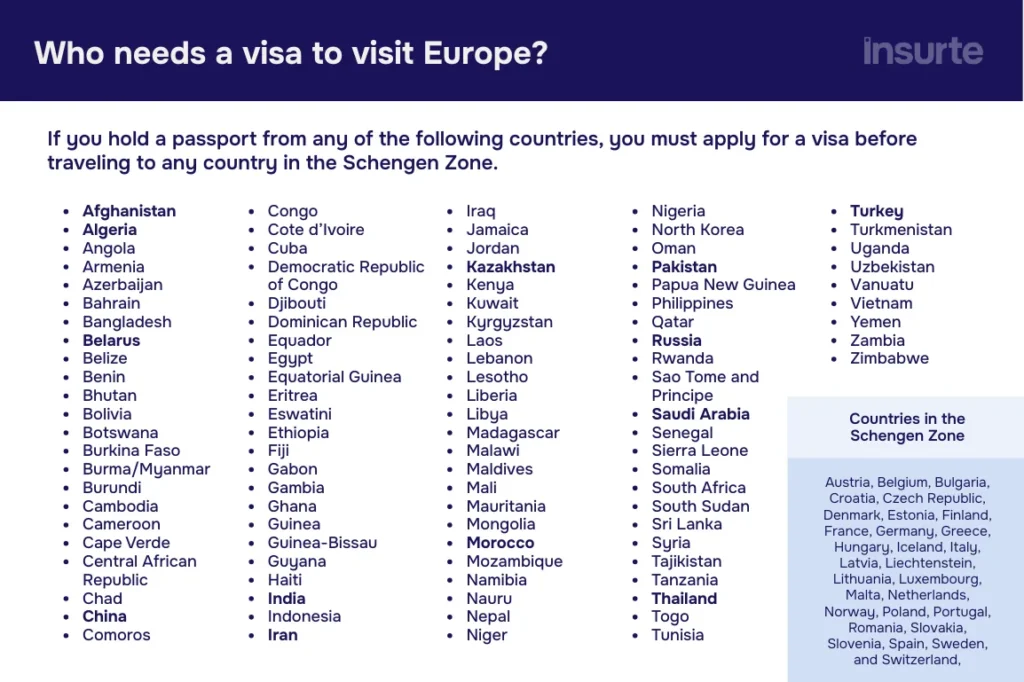
Who needs a Schengen visa?
Depending on your nationality, you may need a visa to visit the Schengen area.
Whether or not you need a Schengen visa mostly depends on your nationality, but it can also depend on how long you want to visit, as well as why you're traveling, too.
Different countries have different agreements with the Schengen area. Because of this, citizens of some countries don't need to have a visa, while citizens of others do.
For example, Chinese, Indian, and South African passport holders must have a visa to visit the Schengen area, even if they're only visiting for a day.
On the other hand, some travelers don't need a visa, such as citizens of the US, UK, Australia, Canada, and Japan.
Anyone who wants to spend more than 90 days (within a 180-day period) in the area has to apply for a visa.
Note: EU/Schengen country citizens do not need a visa to travel to the Schengen area.

Current Schengen visa requirements
For short stays, Schengen visa applications require a basic list of documents. All of these documents need to be prepared and ready before your visa application appointment.
While this is the list of the core application requirements, there may be additional documents required depending on your specific situation. Other documents can include employment letters, birth certificates, or work contracts, for example.
1. A visa application form
The main document that you will need is the application form itself. You can find this form here. You may also receive a copy from the visa application center or consulate where you are applying.
You'll need to fill out the form with several different pieces of information, like your name (make sure it matches your passport), your birthdate, address, and more.
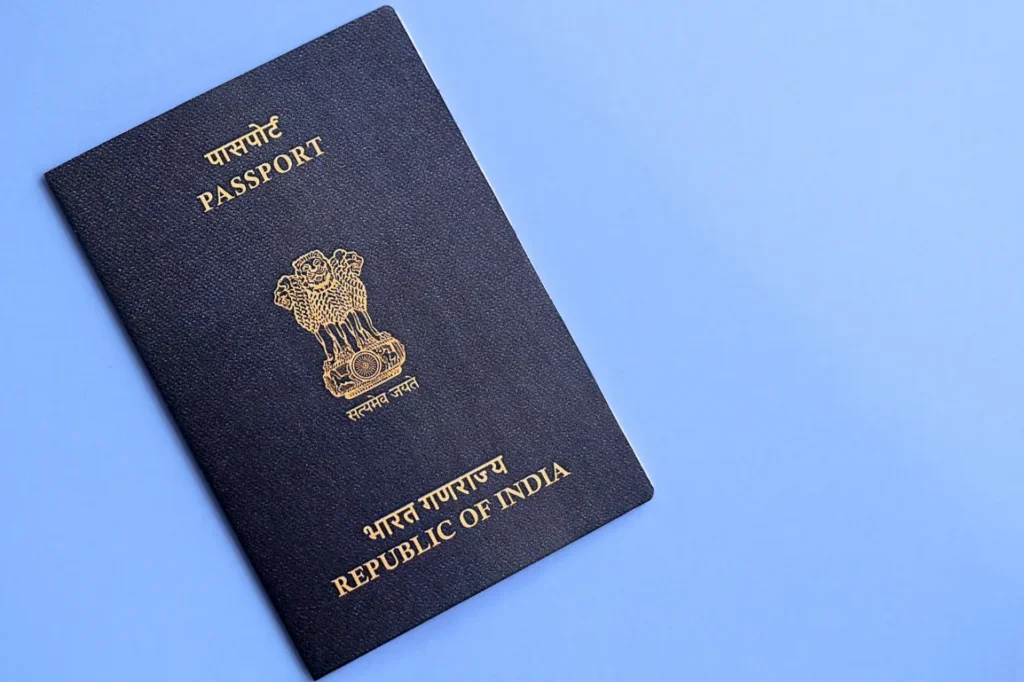
2. A valid passport
All Schengen visa applications require a valid passport/travel document.
If your passport is about to expire, that can be a problem. In order for your passport to be valid for your application, it must continue to be valid for at least three months beyond your planned stay in the Schengen area.
So, for example, if you are going to the Schengen area and flying home on March 3rd, your passport has to have an expiration date after May 3rd (3 months down the line).
Additionally, your passport typically needs to have at least two blank pages for stamps.
If your passport expires soon, renewing it before applying for your visa is recommended.
Pro tip:
Currently, Schengen visa applications have be done in person at a visa center (if there isn’t a visa center in your country of residence, you may be required to apply through a consulate or embassy).
When you submit your visa application, you must hand over your passport. This means that you will be without your passport while your visa application is processed, which can take anywhere from a few days to multiple weeks (depending on the type of visa and seasonality).
Make sure you don’t have any international trips planned directly after your visa appointment, since you will be without your passport while your visa application is being processed.
Don't worry, though. Once a decision has been made regarding your visa, your passport will be returned to you, usually by mail.
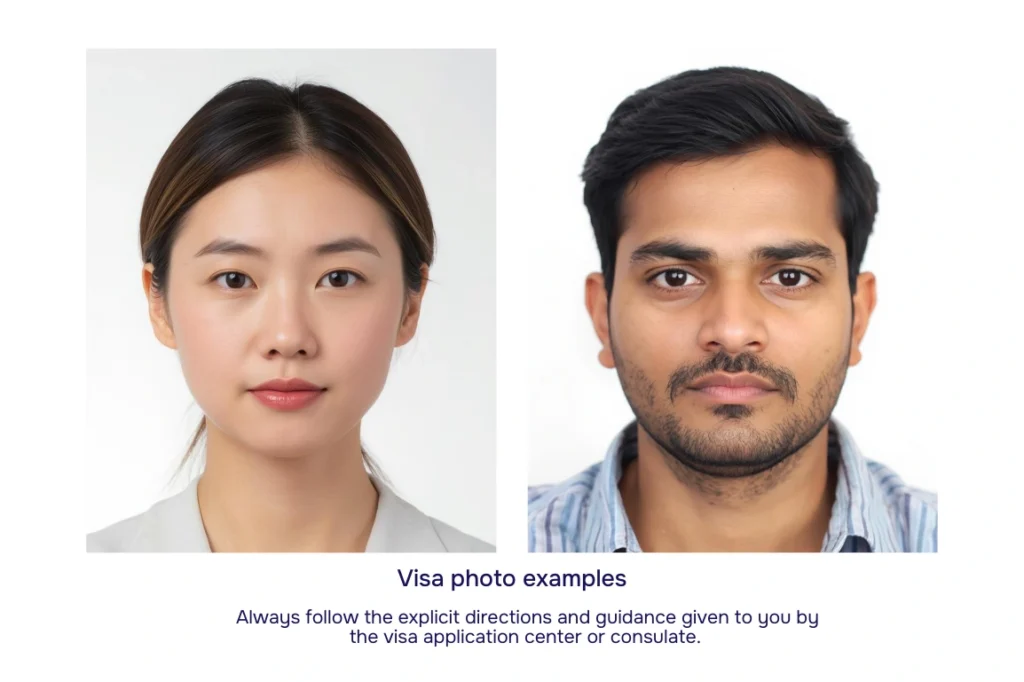
3. Recent, passport-sized photos
All Schengen visas have a photograph of the visa holder. You will need to include a recent photo that meets Schengen visa photo requirements.
The photo has to meet the following criteria:
- Size: 35mm x 40mm.
- Taken within the last six months.
- In color, with a white or plain light-colored background.
- Neutral facial expression with a closed mouth (no big smiles or smiling with teeth).
- If wearing glasses, there cannot be a glare in your lenses, and your eyes must be completely visible. Try to avoid thick frames.
- No head coverings are allowed in your Schengen visa photo, unless they're worn for religious reasons. Still, your face must be fully visible.
- You should not have hair covering your eyes. If you have bangs, it might help to pin them back for your photograph or swipe them to the side.
While the details above are from the French government, it’s always best to check with your respective visa center for any additional Schengen countries' visa requirements when it comes to photo specifications.
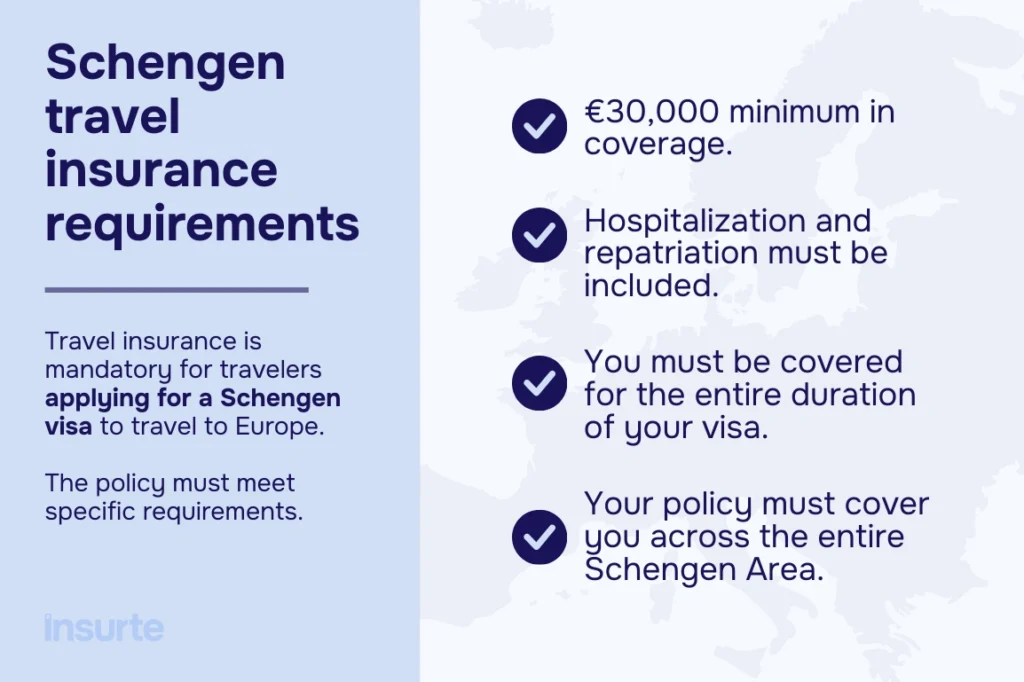
4. Proof of travel insurance
All Schengen visa applicants have to take out a travel insurance policy that meets Schengen visa insurance requirements.
The policy that you choose must have specific coverage, and you also have to purchase it before you submit your visa application.
Here are the specific requirements that the insurance policy you choose needs to meet:
- Minimum coverage of €30,000 for medical emergency costs.
- Valid in all Schengen countries.
- Coverage for medical emergency costs, medical evacuation, hospitalization, and repatriation.
- Valid for the entire duration of your stay in the Schengen zone.
- Claims against the insurance company must be recoverable in a Schengen member state (according to Article 15 of the Schengen visa code).
It’s important that you make sure your travel insurance meets all of the listed Schengen visa insurance requirements. If it doesn't, your visa will likely be denied.

5. Proof of accommodation
When applying for a Schengen visa, you have to show proof of where you’ll be staying during your trip. This is what they mean when they ask for proof of accommodation.
Typically, this comes in the form of a hotel booking (or vacation rental), a private rental agreement, or even an invitation from a host if you’re staying with friends or family.
Some countries may have specific criteria when it comes to staying with a host, so make sure you check the policies for the destination you’ll be traveling to.

6. Proof of financial means
All applicants have to show that they have sufficient funds to cover their expenses during their stay.
Usually, this is demonstrated through bank statements, pay slips, and sometimes a work contract or letter from your employer.
Each country in the Schengen area has different minimum requirements, monetarily speaking. Typically, you need to show proof that you have the funds to cover a daily amount set by the country you’re going to.
For example, if the daily requirement is 50 euros and you’re staying in the Schengen area for 35 days, you’ll need to show that you have at least 1750 euros to provide for yourself during your stay. (50 x 35 = 1750).
Most Schengen countries require anywhere from €35 - €150 per day, but it varies, so always check for your specific country.
This amount can also differ depending on your accommodation type. For example, if you’re staying with family, the minimum financial requirement could be decreased because the government is assuming you’ll be partially supported by your host.

7. A flight itinerary
When you apply for a Schengen visa, you'll need to show that you have a round-trip flight reservation. This is referred to as a flight itinerary.
Your flight confirmations should show the date you enter the Schengen area as well as the date you leave it.
If you’re heading abroad for a longer stay and don’t know when your return date is, it may be possible to present a one-way ticket. In this case, check with your visa center for any specific Schengen visa requirements for this situation.
8. Biometrics
While it isn’t a document that you can prepare ahead of time, it is a requirement for your Schengen visa application. The Schengen area requires that all visa applicants be fingerprinted at a visa center.
If there isn’t a visa center in your country of residence, biometric collection may take place at a consulate.
You will be instructed by the embassy or visa processing center on how to proceed with your biometric collection at the time of your application submission.
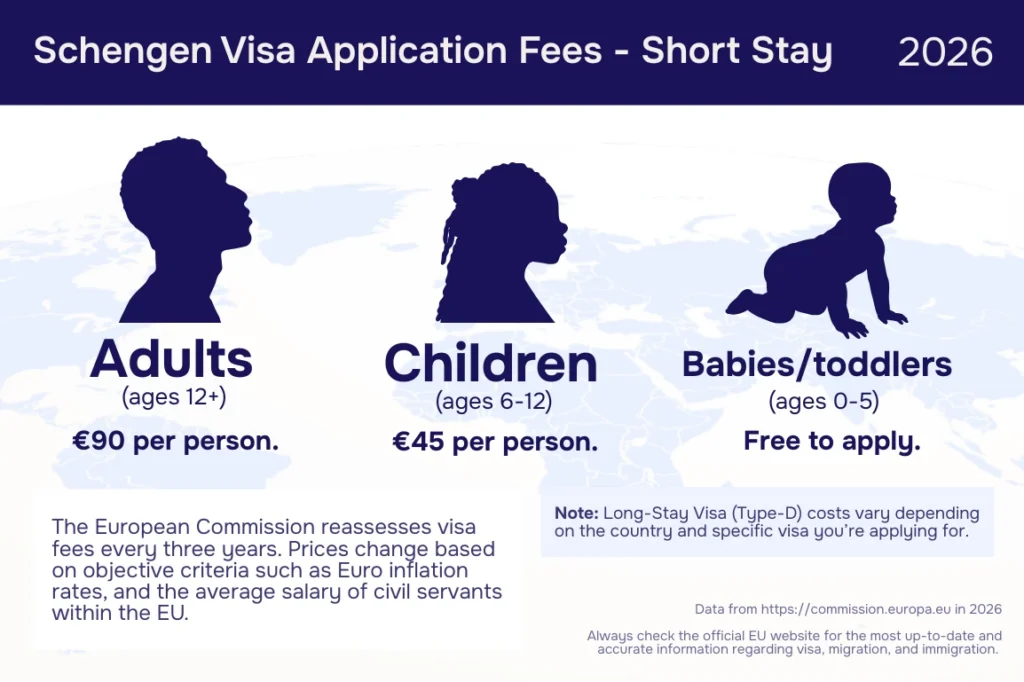
9. Payment
In order to submit your visa application, you will need to have paid all associated visa application and service fees.
The current Schengen visa fee is €90 per adult, €45 for children ages 6-12, and waived for children under the age of 6.
There are usually additional service fees for anyone applying through a visa application center (which, in many cases, is mandatory).
Schengen application formatting
It’s always best to check with the specific visa center in question, but in some cases, different countries may require your documents to be presented in specific ways.
For example, some countries may require that any (or all) official documents have official, notarized translations alongside the originals.
It’s also possible that a country will ask you to have all of your supplementary documents (such as a marriage license or birth certificate, if applicable) notarized.
In some situations, there may be a specific number of photocopies required. For example, a specific country might request 2 photocopies of your passport, along with the original passport itself.
Because requirements can vary so greatly, you must check directly with the embassy or visa center to ensure you deliver your documents in the expected format(s). When you begin the visa application process, you will receive an official checklist of which documents you'll need to provide.
All-in-all, even if you can meet all of the Schengen visa requirements, if you don't present them in the required formats at your visa appointment, your application may be delayed or denied.
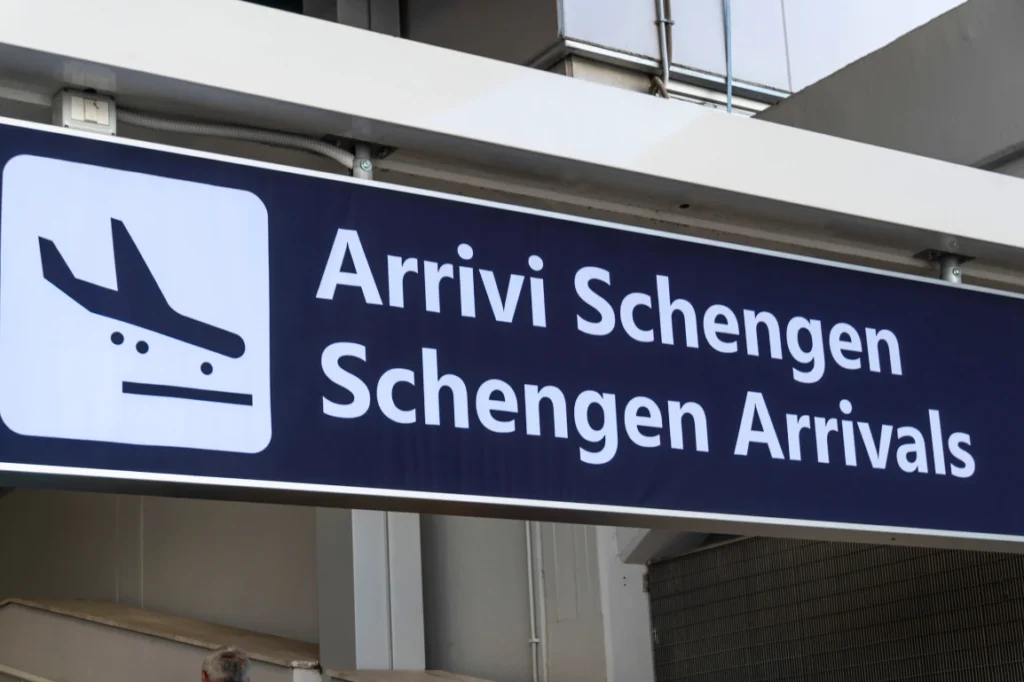
Schengen visa validity
There is a difference between how long a Schengen visa can be valid for and how long yours is valid for. But first, you need to understand that there are different types of Schengen visas.
It's possible to have:
- A single-trip Schengen visa. This visa allows you to go to the Schengen area one time during its validity. These visas can be valid for up to 90 days in duration, though it doesn't automatically mean your visa will be valid for 90 days.
- A multi-trip Schengen visa. This visa allows you to visit the Schengen area two or more times (depending on the allowance) during your visa's validity. Keep in mind that each trip to the Schengen area has a maximum duration. This is typically 90 days in any given 180-day period. Multi-trip visas can be valid for months or even years. It depends on your destination, the reason for your travels, and your nationality.
You can learn more about the different types in our Multiple Entry Schengen Visa Guide.
In most cases, travelers apply for specific dates, anywhere from a couple of days in duration up to 90 days maximum. This could be a week, 10 days, a few weeks, etc. It depends on your plans and budget.
How long your visa can be valid for
Single-trip Schengen visas have a maximum of 90 days in duration. When you apply, you'll need to list the specific dates that you intend to be in the Schengen area.
The maximum validity for multi-trip Schengen visas depends on what is available to you in your local visa application center/Embassy/consulate. No matter how long your multi-trip Schengen visa is valid, you'll still only be able to visit the Schengen area for up to 90 days in any given 180-day period.
Your approved visa will list its validity on it. The expiration date or "until" date is the date that you must leave the Schengen zone. When your visa says "visa valid until date...", it means that your visa will expire on the date given, and you must leave the Schengen area.
According to the France-Visas website, for example, the maximum length of a stay will be indicated on your visa.
The European Union has created a handy calculator that can help you understand how long you can stay in the Schengen area.
Schengen visas allowing you to stay more than 90 days
It is possible to apply for a visa that allows you to stay in the Schengen area for more than 90 days, but this is typically referred to as a Long Stay Visa or a Type-D visa, and these visas have different requirements than your standard short stay Schengen visas.
If you're hoping to spend a longer time in one of the Schengen countries, you will need to apply for the appropriate visa or residence permit for a specific country.
FAQs about Schengen visa requirements
Popular visa guides
Read more about getting a visa in some of our most popular visa guides.
